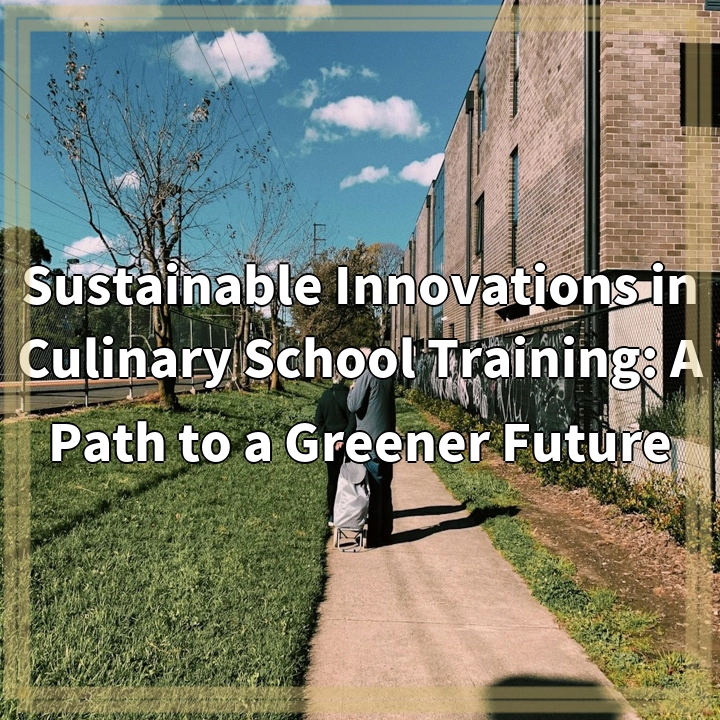
What it is:
Culinary school training has traditionally focused on honing cooking techniques and gourmet creations. However, in recent years, there has been a growing emphasis on incorporating sustainability practices into culinary education. Sustainable innovations in culinary school training aim to equip future chefs and culinary professionals with the knowledge and skills to create delicious and nutritious meals while minimizing their environmental impact.
Real-World Problems:
1. Food Waste:
One of the significant challenges in the culinary industry is food waste. According to the Food and Agriculture Organization (FAO), around one-third of all food produced globally is wasted. Culinary schools play a crucial role in addressing this problem by teaching students about proper food handling, portion control, and creative use of ingredients to minimize waste. Sustainable culinary training can help future chefs become more conscious of their food practices and find innovative ways to reduce food waste in their professional careers.
2. Energy Consumption:
Culinary training often involves the use of energy-intensive equipment such as ovens, stoves, and refrigerators. As energy consumption contributes to greenhouse gas emissions and environmental degradation, culinary schools are seeking sustainable alternatives. Integrating energy-efficient appliances and teaching students about energy-saving techniques can significantly reduce the carbon footprint of culinary operations. By instilling sustainable practices, culinary schools can encourage responsible energy use in the industry.
3. Chemical Usage and Pollution:
The food industry has traditionally relied heavily on chemicals, such as pesticides, preservatives, and synthetic additives. However, the increased awareness of the harmful effects of these chemicals has led to a demand for more sustainable approaches. Culinary schools are addressing this issue by teaching students about organic and locally sourced ingredients, as well as the use of natural alternatives for food preservation and flavor enhancement. By reducing chemical usage, culinary professionals can contribute to a healthier and more sustainable food system.
4. Sustainable Sourcing:
The culinary industry heavily relies on the sourcing of ingredients, which can have significant environmental and social implications. Unsustainable farming practices, deforestation, overfishing, and labor exploitation are just a few of the issues associated with ingredient sourcing. Culinary schools are incorporating lessons on sustainable sourcing, ethical farming practices, and supporting local and environmentally responsible suppliers. By promoting sustainable sourcing, culinary professionals can help protect biodiversity, support local economies, and reduce their ecological footprint.
5. Lack of Awareness:
One hurdle that must be overcome is the lack of awareness and proper education regarding sustainable practices in the culinary industry. Many aspiring chefs and culinary professionals are not exposed to the concepts of sustainability during their training. To address this, culinary schools are now incorporating sustainable innovations into their curriculum, ensuring that students have the necessary knowledge and understanding of sustainable practices. By raising awareness and providing education on sustainability, culinary schools can prepare future chefs to be leaders in creating a greener and more sustainable future for the food industry.

Solutions to Real-World Problems:
1. Food Waste:
To tackle food waste, culinary schools can teach students about proper food handling techniques, portion control, and creative use of ingredients. By instilling a mindset of mindful consumption and innovative culinary approaches, future chefs can minimize waste and contribute to a more sustainable food system.
2. Energy Consumption:
Culinary schools can address energy consumption issues by incorporating energy-efficient appliances and teaching students about energy-saving techniques. By emphasizing responsible energy use and promoting sustainable practices, culinary professionals can significantly reduce the carbon footprint of their operations.
3. Chemical Usage and Pollution:
To reduce chemical usage and pollution, culinary schools can educate students about organic and locally sourced ingredients, as well as natural alternatives for food preservation and flavor enhancement. By promoting healthier and more sustainable practices, culinary professionals can contribute to a safer and more environmentally friendly food industry.
4. Sustainable Sourcing:
Culinary schools can encourage sustainable sourcing practices by teaching students about ethical farming, supporting local suppliers, and considering the environmental and social implications of ingredient sourcing. By promoting sustainable sourcing, culinary professionals can help protect ecosystems, support local economies, and engage in responsible food production.
5. Awareness and Education:
Culinary schools have the opportunity to raise awareness and provide education on sustainable practices. By incorporating sustainable innovations into their curriculum, culinary schools can ensure that students graduate with a strong understanding of sustainability and are equipped to implement green practices in their future careers, ultimately creating a greener and more sustainable food industry.















